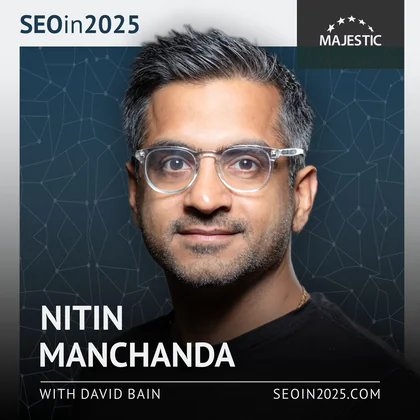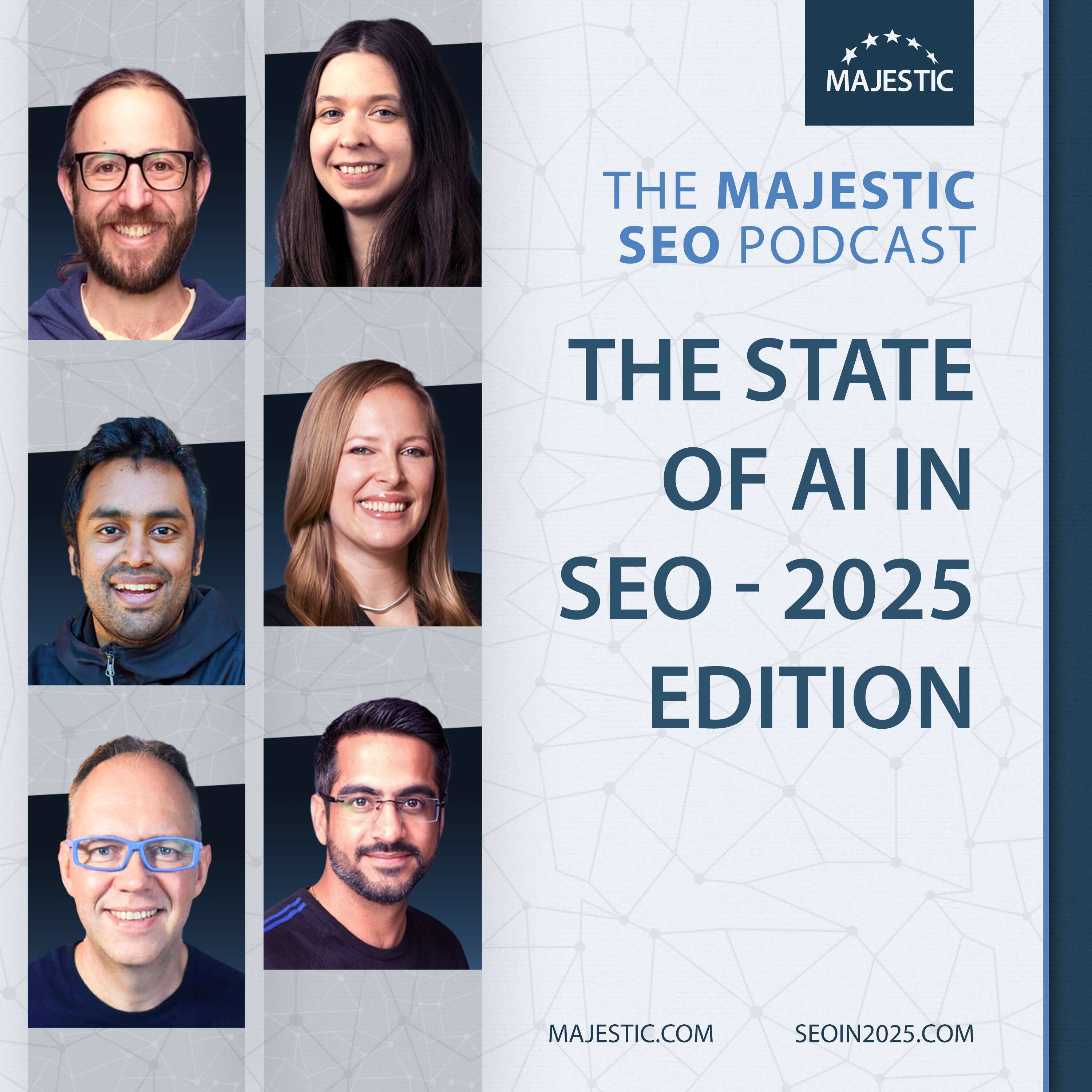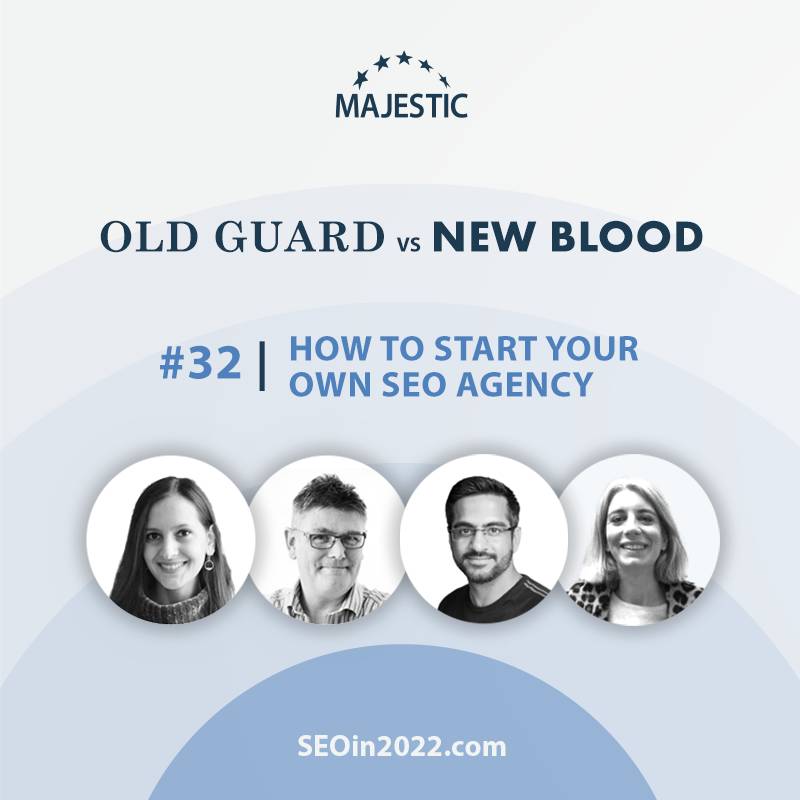-
Site Explorer
- Majestic
- Summary
- Ref Domains
- Backlinks
 New
New Lost
Lost- Context
- Anchor Text
- Pages
- Topics
- Link Graph
- Related Sites
- Advanced Tools
- Author ExplorerBeta
- Summary
- Similar Profiles
- Profile Backlinks
- Attributions
- Compare
-
Link Tools
- My Majestic
- Recent Activity
- Reports
- Campaigns
- Verified Domains
- OpenApps
- API Keys
- Keywords
- Keyword Generator
- Keyword Checker
- Search Explorer
- Link Tools
- Bulk Backlinks
- Neighbourhood Checker
- Submit URLs
- Experimental
- Index Merger
- Link Profile Fight
- Mutual Links
- Solo Links
- PDF Report
- Typo Domain
- Free SEO Tools
- Support
Change SEO into search experience optimisation, or organic discovery optimisation
Nitin Manchanda
Many SEOs are starting to view the very term ‘SEO’ as outdated – and Nitin Manchanda from Botpresso is one of them. He thinks it’s time to start talking about search experience optimization.

Change SEO into search experience optimisation, or organic discovery optimisation
Nitin says: “Search experience optimization is the new definition of SEO.
We should stop thinking only about optimizing for search engines and think more about search experience.”
How different is search experience optimization compared to search engine optimization?
“It’s basically about optimizing for the user experience and not just pleasing search engine bots. That means not just thinking about generating traffic, but also thinking about converting that traffic to a dollar value, which can make everyone happy.
You’re thinking about user intent, search patterns, what exactly they’re looking for on your website, and how they consume content. You’re thinking about how you should be presenting your content on your website for any given topic, what kind of depth they’re looking for, factual correctness, content freshness, etc.
We have been speaking about site speed for years now, but it’s still a very important factor – not from an SEO perspective, but in terms of user experience. If you have a site that is loading fast and giving a nice experience to the user who’s landed there, you will be able to convert them better.
Therefore, search experience optimization is something you should be looking for and you should not be missing out on these parameters.”
Are rankings not as important for search experience optimization?
“No, they are definitely important. However, if you’re ranking with landing pages and not able to serve the best experience, you will not be able to retain those rankings for long.
If you want to rank and retain those rankings for longer – and convert that traffic to the value that you really care about, which is revenue – then you should think about optimizing the overall experience. If you’re able to do that, you will be able to not just rank but also retain those high rankings.
For rankings that are not in the top 3 premium positions, you will gradually jump up if you’re able to give the best experience to users.
It’s about how we can do more than just please search engines but also optimize the experience. You could change the whole acronym because it’s not only about search as much as it is about the overall experience on a website. It could be called user experience optimization, with the top layer being SEO.
The SEO element helps you understand where the demand is and how you can satisfy that demand. The ultimate aim is still to get people to your website. It’s not enough for people to just find your content and interact with it on other platforms, like social media.”
Would organic discovery optimization be a helpful term, because you’re optimizing any touchpoint where users can find you?
“100%. I love that term. I would definitely be more inclined towards optimizing for organic discovery as a whole, rather than just search.
Nowadays, when we talk about organic and SEO, we know there are many other parameters, such as YouTube and social as well. They can also be part of organic discovery.”
Why is optimizing for user intent, behaviour, and expectations important in the new landscape of SEO?
“Optimizing for user intent was always important but it has become more and more important because now there are a lot of brands. Writing content with the help of AI is not difficult, for example. In a week, you can build a process that generates unique content which helps your users.
However, you should be able to understand what your users are looking for from your website and your brand, regarding a given topic. If you’re not able to understand that, you will never be able to write, plan, and structure content for them.
Once you understand what they’re looking for, their intent, and the depth they’re expecting, you can plan and structure your content better. Then, you will be able to easily convert that traffic to the ultimate value you’re looking for which, in most cases, is revenue. If you don’t do that, you might see your users gradually lose trust in your website.
When I’m talking about intent, I’m also implicitly talking about the factual correctness and freshness of the content. Say you’re a travel brand selling tickets from A to B, and someone lands on the website. You might have amazing content that covers everything they’re looking for but, if the content is not correct – and you say that the tickets cost 50 euros when they actually cost 70, for example – then the content is not fresh enough.
Maybe you are caching content that is not getting refreshed frequently enough. That breaks the experience, and it also gradually breaks the trust. Understanding their intent and what they’re looking for on that particular topic is very important. Therefore, understanding intent, and optimizing for that, is important.”
Do other teams, like paid search, also need to get better at making sure the content they are displaying is correct and up-to-date?
“Absolutely. When I worked at Omio, we were caching, but we had to figure out how long we should be caching for. We had 200,000 pages when I started, and then we grew them to 1,000,000. If we kept changing the prices on all those pages, that would be a very expensive affair for our servers. We couldn’t do that, but how often should we be refreshing that content?
Should you be doing it independently or, whenever someone searches for something, should you replace the values with the most accurate and up-to-date versions? There are a lot of different mechanisms for doing that, but it is very important.
I was recently working with a massive brand that was generating millions of organic sessions a month. The problem with their content was that it was very heavy on text. They were happy, and they were pleasing the search engine bots for some time, but then they started seeing a flat organic growth trajectory. When we began working together, I told them that this was the number 1 thing that we needed to fix.
We needed to think about what the users were looking for and how we should optimize the structure of this content – and bring in some visual content as well. If it’s too tech-savvy, no one is going to read it. We ran some experiments to understand how many people were scrolling down to the bottom to read this content, and the answer was around 1.3%.
They were able to please search engine bots because they had a good amount of content on their landing pages, and they managed to rank for some time, but after that, it was flat. They were stuck on position 3 or 2, and they were not able to go up. In some cases, they were even losing those ranks.
The answer is that they were never optimizing for user experience. They were only thinking about pleasing search engine bots. If they were making some users happy in the process, it was not due to any deliberate action that they had taken.”
When you are planning, what comes first, user intent or content?
“You should follow the traditional process where you start with keyword research. However, it’s important to understand what those keywords mean. One keyword can be used in a transactional search, but the same keyword can also be informational. Understanding exactly what people are looking for from that keyword is important.
When we were working at Omio, we had landing pages like ‘London to Paris’. When we did our research, we found out that there are a lot of people searching for ‘fastest connections’, ‘the next train from London to Paris’, and also ‘cheapest connections’. We had just one landing page for all of these intents, and it was really difficult to decide what to show first.
If you’re searching for the fastest connection and we show the cheapest deals first, you might not be looking for that. If you’re looking for the next immediate connection and we tell you that the fastest connection is in 6 hours, that might not be what you were looking for. Understanding intent, exactly what users looking for, and how you can present that information is very important.
In that case, we had different tabs. We were able to show a quick snippet of all three of the intents that we were covering on that landing page. We also ran another experiment where we had separate landing pages for all the different intents, which gave good results as well.
Start with the basics of keyword research. Then you start experimenting, and those experiments will tell you how users are perceiving the content that you have on the landing page. Then you can optimize for that.
Optimizing for search experience is not a one-time exercise. It is a marathon. You keep on doing it, and you keep optimizing. It never ends.”
Do you see any implications of the recent AI developments and search experience?
“I’m a big fan of AI because, at Botpresso, we have been using AI for building a lot of different applications – from micro-crawlers to amazing-looking Python scripts – which are resolving a lot of problems for us.
People have started using AI for content production, which is the most common use case. However, what they miss is the personalisation element. You are giving instructions to machines and getting some content, but that content is generic. If you’re doing it right, it will be pretty good, but is it personalised? Is it written for your brand? Is it written for the users that you are getting?
It’s very important to understand how you can give that personalised experience, and how you can talk to your user when they’re landing on your website.
We recently started running some experiments using RAG (Retrieval Augmented Generation). For example, TripAdvisor has a lot of reviews, which is a lot of user-generated content. They’re using RAG to create a quick summary that helps a user understand everything that those reviews are saying. You don’t have to go through 500 comments to learn about a particular place, you can just go and see a summary of what people like about it and what they don’t.
A lot of other brands have started doing this as well, like Amazon. When you’re looking at reviews, they give you a quick snapshot of what people thought about that particular product. I love that. I’m investing a lot of time in this idea for travel brands. If you’re travelling to Paris, you can get recommendations for family-friendly travel. Then, you would see all the reviews that refer to family-friendly travel to Paris. They are aggregated, and they give you a nice summary of all the tips people have posted for travelling with family and having younger kids with you.
That’s awesome. You don’t have to go through all the reviews, or even filter them, to see what is important for you. Personalising that, and helping a user better understand your content, is where AI can help you a lot.”
If an SEO is struggling for time, what should they stop doing right now so they can spend more time doing what you suggest in 2025?
“Stop chasing those shiny stones. Every now and then, people start talking about something like site speed. I mentioned that site speed is still important, however, a couple of years back, it became the topic of the year. Everyone was talking about site speed, and they were chasing how to go from 90 to 100. Stop chasing that. Think about user experience.
Even at a speed of 90 or 80, if you are able to serve an amazing experience to users, that is the most important thing. Stop chasing these fancy and shining stones – even for content production.
There is a lot of discussion about whether AI-generated content is good or bad. Go and check Google’s guidelines. They say that, if you’re writing content that is meaningful and it’s not just written for search engine bots, then that is good enough. Think about how you can use machines as your efficiency weapon and not to abuse or manipulate search engine bots.
If you do that, that is all you need. Think about search experience, think about your user, and keep them at the centre while you’re working on your SEO strategy.”
Nitin Manchanda is Founder and Chief SEO Consultant at Botpresso, and you can find him over at Botpresso.com.
Also with Nitin Manchanda
Choose Your Own Learning Style
 Video
Video
If you like to get up-close with your favourite SEO experts, these one-to-one interviews might just be for you.
Watch all of our episodes, FREE, on our dedicated SEO in 2025 playlist.
 Podcast
Podcast
Maybe you are more of a listener than a watcher, or prefer to learn while you commute.
SEO in 2025 is available now via all the usual podcast platforms
Don't miss out
Opt-in to receive email updates.
It's the fastest way to find out more about SEO in 2025.
Could we improve this page for you? Please tell us








